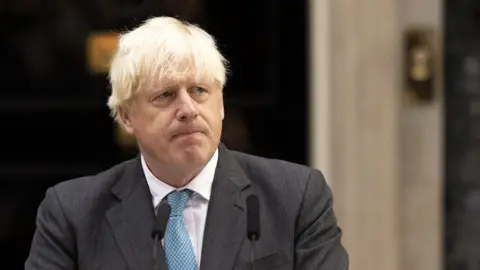Partygate returns: MPs' inquiry into Boris Johnson explained
 Getty Images
Getty ImagesBoris Johnson is gearing up for a grilling from a committee of MPs that could determine his political future.
The former prime minister has been battling accusations that he misled Parliament over the Partygate scandal that played a key part in his ousting from office last year.
Now he has set out his defence in writing, ahead of a televised hearing in front of the committee on Wednesday.
It's been a while since Partygate has dominated the headlines - so here's what you need to know.
Recap: why is he being investigated?
Opposition parties have accused Mr Johnson of misleading MPs about what he knew about gatherings in government buildings during Covid lockdowns.
A probe by the Commons Privileges Committee, commissioned by the Commons in April last year, has been examining whether he did.
On several occasions after the Partygate scandal emerged in late 2021, he told the Commons that pandemic rules had been followed.
But an investigation by senior official Sue Gray later found widespread rule-breaking had in fact taken place. And a police inquiry led to fines for 83 people, including Mr Johnson himself, for attending law-breaking events.
The ex-prime minister has admitted that MPs were misled by his statements, but he says he believed them to be true at the time, and his denials about rule-breaking were made in "good faith".
What will the committee decide?
The seven MPs on the committee will determine whether Mr Johnson committed a so-called "contempt" of Parliament by preventing it from doing its job of holding him to account.
They have decided that whether he intended to mislead MPs is not relevant when judging whether this offence was committed.
But if they find that it was, then his intentions will be considered when deciding any punishment they recommend.
A finding that he deliberately misled MPs is likely to attract the strongest sanction.
Another option is they find he "recklessly" misled Parliament - likely producing a sanction that is less severe.
The former PM's allies have accused the committee of upending convention in this area and being biased against him.
The committee has rejected this, saying it has been acting on the advice of impartial officials.
 Cabinet Office
Cabinet OfficeWhat have the MPs said so far?
In an interim report earlier this month, the committee said Parliament "may have been misled" multiple times.
The evidence, it added, strongly suggests that breaches of pandemic guidance would have been "obvious" to Mr Johnson at the time.
They also concluded that his statements in the Commons, as well as his performance at Covid press conferences, show that he understood what the rules were.
What about Mr Johnson?
In a 52-page document published ahead of his televised hearing, he denied having misled Parliament "intentionally or recklessly".
He said he hadn't thought events he attended were in breach of the rules, and his officials had never told him any other gatherings were either.
He added that he had "corrected the record" as soon as possible after Ms Gray's report was published.
And he hit out at the committee, accusing it of departing from the precedents set by previous inquiries and calling the offence of misleading MPs recklessly an "entirely novel concept".
Who sits on the committee?
The Conservative-majority committee is chaired by senior Labour MP Harriet Harman, a former cabinet and shadow cabinet minister.
She took on the role in June last year from party colleague Sir Chris Bryant, who stepped back because he had criticised the PM in media interviews before the inquiry was launched.
The other members are Labour's Yvonne Fovargue, the SNP's Allan Dorans, and Tories Andy Carter, Sir Bernard Jenkin, Alberto Costa, and Sir Charles Walker.
A former appeal court judge, Sir Ernest Ryder, has been appointed to advise them during the probe.
What evidence have they collected?
The committee has taken written evidence from 23 witnesses. Their names have been shared with Mr Johnson, although some have requested their names are not published by the committee.
The MPs have also been given records from Sue Gray's investigation, Mr Johnson's official diaries, emails between officials and pictures taken by Downing Street's official photographer.
The committee also conducted a "site visit" to 10 Downing Street last month, to inspect areas where gatherings mentioned by Mr Johnson in the Commons were held.
MPs on the committee have been able to read evidence turned over by the government in a reading room, under the invigilation of officials.
 Cabinet Office
Cabinet OfficeMr Johnson has also handed over 46 WhatsApp messages showing his conversations with five as-yet unknown people.
They were disclosed through his lawyers, who have been paid for by the taxpayer under a government contract awarded last August, when he was still in office.
Although it's not a legal process, he will be able to bring a lawyer with him during Wednesday's televised hearing, which could last up to five hours.
However, Mr Johnson will have to answer MPs' questions himself.
What could the consequences be?
The full House of Commons will have to approve the committee's recommendation, as well as any sanctions.
The possible punishments range from ordering him to apologise to suspending him from the Commons.
If they decide to suspend Mr Johnson for more than 10 days, it would trigger a "recall petition" in his Uxbridge and South Ruislip constituency, a process that could potentially lead to a by-election.
Suspensions of this length, however, have been rare in recent years.
The outcome of the inquiry will be pivotal for Mr Johnson's political future. Any finding that he misled Parliament could sink his hopes - never ruled out - of one day returning to high office.
Mr Sunak has already decided he will not instruct Conservative MPs how to vote on the committee's report.
But whatever the outcome, tensions within the Conservative Party could reignite over the issue.